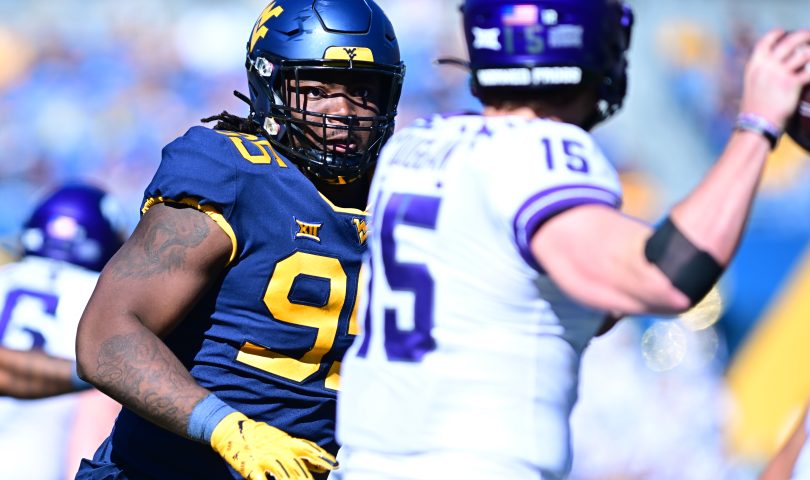MORGANTOWN — When something isn’t working, you need to fix it.
For large stretches of this season, West Virginia’s defense has not been working. Not even a little. The Mountaineers are last in the Big 12 in scoring defense and are allowing 508.6 yards in conference games.
Opponents have moved the ball at will against WVU this season, shredding an inexperienced secondary through the air and gashing a worn-out front on the ground.
That continued into Saturday’s game against TCU, when the Horned Frogs scored four first-half touchdowns, three of which were on plays of over 50 yards and the fourth on a 30-yard run with 24 seconds left.
And then, something strange happened after halftime — WVU’s defense looked different, competent, even.
TCU’s five second-half drives resulted in a punt, two field goals, an interception and a touchdown when the game was already essentially over.
“Defensively, the first half was bad, way-too-many explosive plays. But they gave us a chance to win in the second half,” WVU coach Neal Brown said Tuesday. “We’ve got to build off that.”
The difference between the first and second halves? A change in philosophy, according to Brown and defensive coordinator Jordan Lesley.
“We’ve got several guys out now and I think you’ve got to play to your strengths sometimes,” Brown said. “You know where you have your issues and you’re trying to cover up some of your issues when maybe the better answer is to play to your strengths. What I’ve encouraged our defensive staff is, let’s play to our strengths.”
The strength of WVU’s defense is the front seven, the defensive line in particular. The weakness is clearly a secondary that has been ravaged by injury and flooded with inexperience.
The return of one player — veteran cornerback Charles Woods — from injury made such an impact in that embattled secondary that it gave Brown and Lesley the confidence to make the switch from trying to cover up the deficiencies on the back end to leaning on the team’s strengths up front.
“We were dropping eight (into coverage) probably a little bit more than we needed to,” Brown admitted. “Our strength on our defense right now is in our front and allowing them more opportunities to do what they do best.”
“Getting Charles back allows you to do that,” Lesley added. “When you pressure a lot, you’re going to have to play some man (coverage). When you get (Woods) back for a full game, it allows you to do a little more of that, and then it creates some single match-ups where our strength is, which is the front of our defense.
“Just having that one guy back was the deciding factor on this being something we think we’ll be able to do.”
Of course, West Virginia still lost to the Horned Frogs, 41-31, but the Mountaineers clearly played better defense in the second half and one might even argue — winning defense.
“It’s frustrating because I know we’re better than what we’ve put out there as an overall season,” senior lineman Dante Stills said. “I know how good we are and there’s been glimpses of that in past games and in the last game that we can be really, really good. It’s just about believing in ourselves and being able to make some plays.”
TCU, the top offensive team in the conference, put up 28 points and 332 yards in the first half but was held to 13 points and 162 yards in the second. Consider that TCU’s final play was a 29-yard touchdown pass with the game already in hand and the Mountaineers’ second-half numbers look very promising, maybe even good.
“I think confidence will help,” Brown said. “That group (TCU) was the top-ranked offense in our league, they’d run the ball for 200-plus yards in every league game coming in and they scored 38-plus. We held them without a touchdown (in the second half) until the fourth-and-one go ball.”
West Virginia moves from facing the Big 12’s best offense to its worse this week with a trip to Ames to play Iowa State on Saturday. The Cyclones are the only team in the conference that averages less than 400 yards (370.1) and 30 points (21.6) per game.
One half of good defense in what was ultimately a loss is nothing to write home about, but it, at the very least, showed some promise, something WVU’s defense has severely lacked this year.
If Woods’ return and a philosophical change are really the cure for the Mountaineers’ ailing defense, then they’ve come at a good time, as WVU’s next three games are against the three lowest-scoring teams in the Big 12 in Iowa State, Oklahoma and Kansas State.
The opportunity to save this season, and possibly some jobs, is there for the taking.
TWEET @CodyNespor




